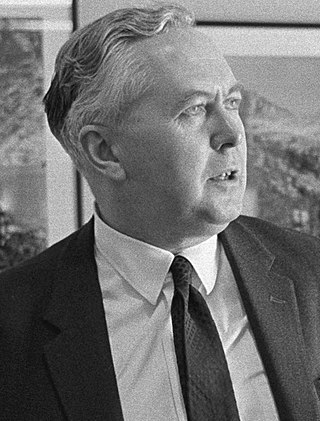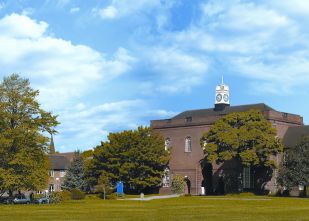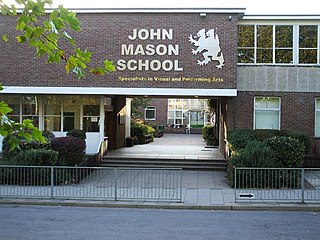Related Research Articles

Margaret Hilda Thatcher, Baroness Thatcher, was a British politician and stateswoman who served as Prime Minister of the United Kingdom from 1979 to 1990 and Leader of the Conservative Party from 1975 to 1990. She was the first female British prime minister and the longest-serving British prime minister of the 20th century. As prime minister, she implemented economic policies that became known as Thatcherism. A Soviet journalist dubbed her the "Iron Lady", a nickname that became associated with her uncompromising politics and leadership style.

The Inner London Education Authority (ILEA) was the local education authority for the City of London and the 12 Inner London boroughs from 1965 until its abolition in 1990. From 1965 to 1986 it was an ad hoc committee of the Greater London Council; on 1 April 1986 it was reconstituted as a directly elected body corporate.

In England, a City Technology College (CTC) is an urban all-ability specialist school for students aged 11 to 18 specialising in science, technology and mathematics. They charge no fees and are independent of local authority control, being overseen directly by the Department for Education. One fifth of the capital costs are met by private business sponsors, who also own or lease the buildings. The rest of the capital costs, and all running costs, are met by the Department.
The Tripartite System was the arrangement of state-funded secondary education between 1945 and the 1970s in England and Wales, and from 1947 to 2009 in Northern Ireland. It was an administrative implementation of the Education Act 1944 and the Education Act 1947.

Charles Anthony Raven Crosland was a British Labour Party politician and author. A social democrat on the right wing of the Labour Party, he was a prominent socialist intellectual. His influential book The Future of Socialism (1956) argued against many Marxist notions and the traditional Labour Party doctrine that expanding public ownership was essential to make socialism work, arguing instead for prioritising the end of poverty and improving public services. He offered positive alternatives to both the right wing and left wing of the Labour Party.

A comprehensive school typically is a secondary school for pupils aged approximately 11–18, that does not select its intake on the basis of academic achievement or aptitude, in contrast to a selective school system where admission is restricted on the basis of selection criteria, usually academic performance. The term is commonly used in relation to England and Wales, where comprehensive schools were introduced as state schools on an experimental basis in the 1940s and became more widespread from 1965. They may be part of a local education authority or be a self governing academy or part of a multi-academy trust.

The Education Act 1944 made major changes in the provision and governance of secondary schools in England and Wales. It is also known as the "Butler Act" after the President of the Board of Education, R. A. Butler. Historians consider it a "triumph for progressive reform," and it became a core element of the post-war consensus supported by all major parties. The Act was repealed in steps with the last parts repealed in 1996.
The post-war consensus, sometimes called the post-war compromise, was the economic order and social model of which the major political parties in post-war Britain shared a consensus supporting view, from the end of World War II in 1945 to the late-1970s. It ended during the governance of Conservative Party leader Margaret Thatcher. The consensus tolerated or encouraged nationalisation, strong trade unions, heavy regulation, high taxes, and an extensive welfare state.

The Plowden Report is the unofficial name for the 1967 report of the Central Advisory Council For Education (England) into Primary education in England. The report, entitled Children and their Primary Schools, reviewed primary education in a wholesale fashion. The collation of the report took around 3 years. The Council was chaired by Bridget, Lady Plowden after whom the report is named.
Robin Clifford Squire is a British Conservative politician. He was Member of Parliament for Hornchurch from 1979 until 1997 when he lost the seat to John Cryer.
Circular 10/65 was a government circular issued in 1965 by the Department of Education and Science (DES) requesting Local Education Authorities (LEAs) in England and Wales to begin converting their secondary schools to the Comprehensive System. For most of England and Wales, it marked the abolition of the old grammar schools and secondary moderns, and the 11-plus examination. Circular 10/65 was the initiative of recently appointed Education Secretary Anthony Crosland; it is sometimes called the Crosland Circular. It reflected the Labour government's view that the existing Tripartite System of education was flawed, and had to be replaced with comprehensive schools, which had been increasing in number over the previous sixteen years.

Harold Wilson was appointed Prime Minister of the United Kingdom by Queen Elizabeth II on 16 October 1964 and formed the first Wilson ministry, a Labour government, which held office with a thin majority between 1964 and 1966. In an attempt to gain a workable majority in the House of Commons, Wilson called a new election for 31 March 1966, after which he formed the second Wilson ministry, a government which held office for four years until 1970.
The history of education in England is documented from Saxon settlement of England, and the setting up of the first cathedral schools in 597 and 604.

A direct grant grammar school was a type of selective secondary school in the United Kingdom that existed between 1945 and 1976. One quarter of the places in these schools were directly funded by central government, while the remainder attracted fees, some paid by a Local Education Authority and some by the pupils' parents or guardians. On average, the schools received just over half of their income from the state.
The National Pension System (NPS) is a defined-contribution pension system in India regulated by Pension Fund Regulatory and Development Authority (PFRDA) which is under the jurisdiction of Ministry of Finance of the Government of India. National Pension System Trust established by PFRDA is the registered owner of all assets under this scheme. National Pension System, like PPF and EPF is an EEE (Exempt-Exempt-Exempt) instrument in India where the entire corpus escapes tax at maturity and entire pension withdrawal amount is tax-free.
The National Grammar Schools Association is an organisation in the United Kingdom which campaigns for the promotion of selective education.

English state-funded schools, commonly known as state schools, provide education to pupils between the ages of 3 and 18 without charge. Approximately 93% of English schoolchildren attend 20,000 or so such schools. Since 2008 about 75% have attained "academy status", which essentially gives them a higher budget per pupil from the Department for Education.

A comprehensive school, or simply a comprehensive, typically describes a secondary school for pupils aged approximately 11–18, that does not select its intake on the basis of academic achievement or aptitude, in contrast to a selective school system where admission is restricted on the basis of selection criteria, usually academic performance. In England and Wales comprehensive schools were introduced as state schools on an experimental basis in the 1940s and became more widespread from 1965. They may be part of a local education authority or be a self governing academy or part of a multi-academy trust.

The Lakes School is a coeducational secondary school and sixth form located in Troutbeck Bridge, Windermere, in the English county of Cumbria.
References
- ↑ "Times Education Supplement". 1000 Years of Education; 1959-1970; Chronology; Millennium Edition.
- ↑ "Thatcher meets NUT deputisation". margaretthatcher.org. Retrieved 31 March 2011.
